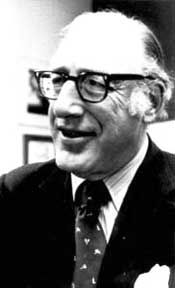Fred Friendly: ‘a tough man but, my God, full of ideas’
Fred W. Friendly, the legendary CBS News producer who tried to bring innovation to public TV in the 1960s and later developed a celebrated series of televised seminars on major public policy issues, died March 3 at his home in New York City. He was 82.
"He was a great broadcaster, a great innovator, a great friend of public television," observed PBS President Ervin Duggan in a release.
At CBS, Friendly worked for years with Edward R. Murrow, producing many of his appearances, including the milestone 1954 report that questioned Sen. Joseph McCarthy's anti-communist campaign and the famous CBS Reports: "Harvest of Shame" on the lives of migrant workers, aired in 1960. He was named president of the news division in 1964 and quit two years later when the network carried an I Love Lucy rerun instead of a Senate hearing on the Vietnam war.
In an epitaph in the Washington Post, CBS anchor Dan Rather called him "a pacing, shouting volcano of a man," who "inspired the people who worked for him to do better work than they ever thought they could do."
Friendly moved directly from CBS into a key position affecting public TV. The day after he quit the network in 1966, new Ford Foundation President McGeorge Bundy asked him to serve as a consultant to review the foundation's extensive activities supporting public TV, according to historian Ralph Engelman.
Friendly and Bundy in 1966 proposed "the People's Dividend": Congress would aid public TV with proceeds from a communications satellite that would carry the commercial networks. Advocates of direct federal appropriations feared the Friendly proposal would sidetrack the forthcoming recommendations of the first Carnegie Commission on educational TV, but instead it may have helped the Carnegie plan.
Neither the commercial networks nor AT&T liked Friendly's idea, recalled public TV leader Hartford Gunn in an oral history interview with Jim Robertson. So when Carnegie Commission Chairman James R. Killian testified for the funding structure that became CPB, "Everybody was saying, 'Go, Jim, get this fellow Friendly off our backs!'" according to Gunn. The incident, he remarked, "is so typical of how our future has been written."
While Friendly taught at Columbia University, he oversaw the latter years of the Ford Foundation's involvement in public TV. James Day, who headed the Ford-funded National Educational Television production center in Manhattan, says it appeared that Friendly was following instructions from Bundy to phase out Ford's heavy spending, which had helped put many stations on the air. After Congress had created CPB, Friendly "tended to support whatever CPB wanted, because that was the best hope of pushing responsibility off onto CPB," says Day.
Friendly and Bundy supported the spinoff of NET's Washington Bureau as the National Public Affairs Center for Television (NPACT), which was later attacked by the Nixon White House.
Early plans for PBS were drafted at the foundation, according to David M. Davis, Friendly's deputy during that period and later head of American Playhouse.
Friendly helped transform the form of nonfiction programming in the 1970s. He put $12.5 million of foundation funds into a live, two-hour, magazine-format program on Sunday nights, Public Broadcasting Laboratory (PBL), to demonstrate innovation and shake up public TV programming. Former CBS producer Av Westin headed a staff of 60, including young reporter Robert MacNeil and future public broadcasters Lewis Freedman, Gerald Slater and John Wicklein, among others. New Yorker critic Michael Arlen wrote that PBL was "the most consistently interesting and substantial public affairs program right now in American broadcasting," but many station leaders objected to its free-wheeling ways and autonomy.
Though Friendly was not the producer of PBL, "you couldn't keep him out of the control room," recalls Day. "He was a tough man but, my God, full of ideas."
Friendly also awarded major Ford grants for Newsroom programs at public TV stations in San Francisco, Dallas, Pittsburgh and Washington that became a model for MacNeil/Lehrer, Nightline and many other news vehicles. Jim Lehrer entered TV through KERA's Newsroom project. The concept popularized the on-air debriefing of reporters in shirtsleeves. But it also led to "happy talk" excesses on commercial TV, regrets James Day, who was then heading KQED in San Francisco.
At another point, to see what could be done with public TV's promotion, Friendly brought in a young advertising man and future PBS president named Lawrence Grossman, according to Day.
Friendly also contributed directly to PBS programming. In the 1970s at Columbia University, he and Stuart Sucherman created the Media & Society Seminars, a series of discussions on major public and ethical issues that is still airing on public TV. The events initially aimed to bring journalists together off-the-air with the legal profession, but the idea was transplanted to PBS, and more than 70 were aired. To illuminate the issues, prominent public figures were put on-camera and given hypothetical situations "so agonizing that they can escape only by thinking," as Friendly put it. He retired from active management of the seminars in 1993 after a stroke, but his wife, Ruth, remained active. The programs are now known as the Fred Friendly Seminars.
Born Ferdinand Friendly Wachenheimer in Providence, R.I., Friendly changed his name when he went into radio in 1937.
Friendly is survived by his wife, three children from an earlier marriage, three stepchildren and 10 grandchildren.
Web page posted April 12, 1998
Copyright 1998 by Current LLC
